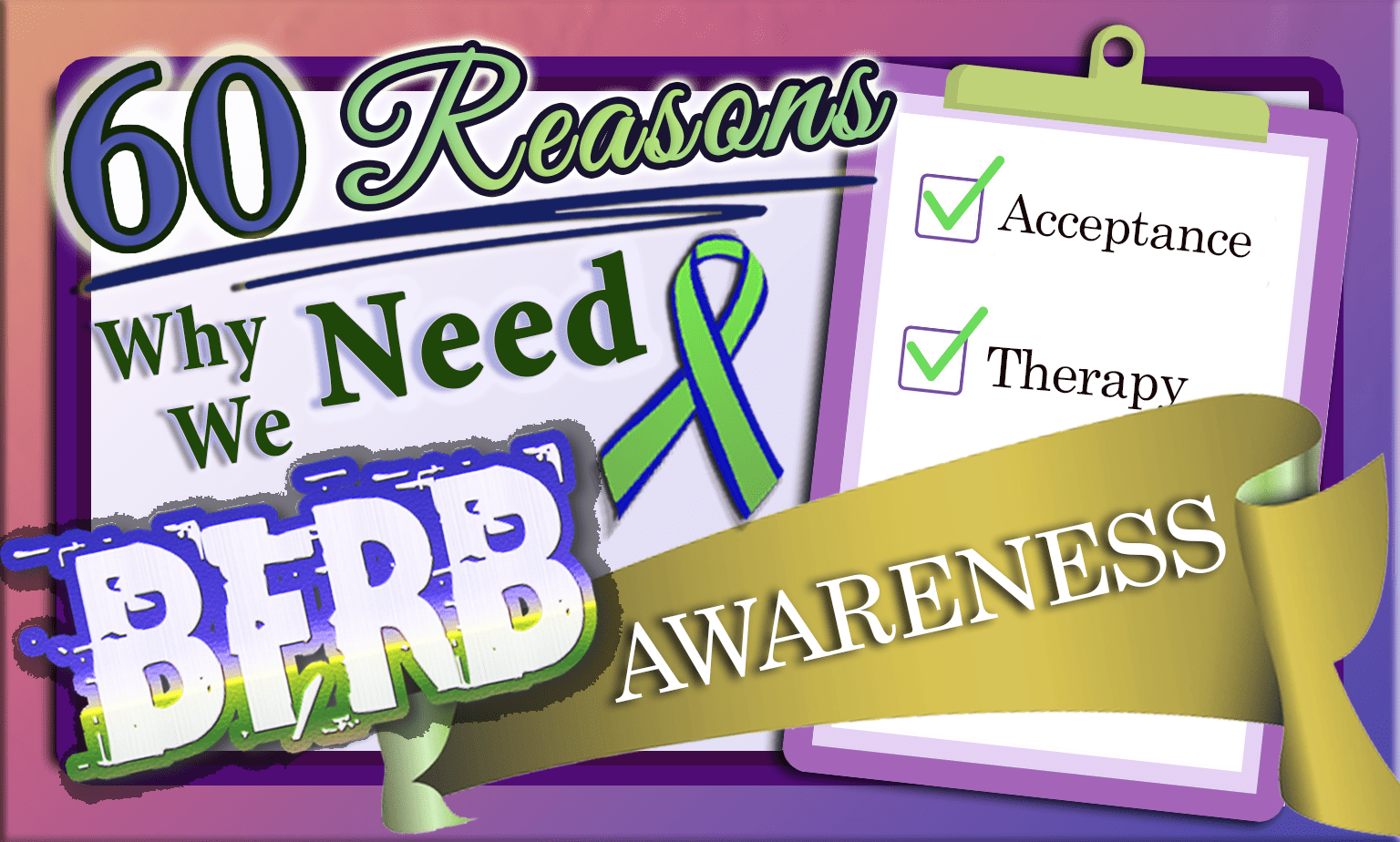Body-Focused Repetitive Behaviors (BFRB’s) are a group of obsessive-compulsive and related disorders which describes a chronic behavior that causes damage to oneself repetitively, often in order to feel psychological relief.
It is important for the public to understand how much people with trichotillomania, dermatillomania, and other BFRB’s struggle and how awareness of these disorders can improve the lives of sufferers. These disorders are not yet well-known to the public, which causes many roadblocks for those seeking help.
We need friends, family, acquaintances, and EVERYONE to spread awareness so that:
1. every one can gain access to effective treatments
2. more treatment options can become available for these disorders
3. at least one BFRB non-profit is established in every country
4. the above non-profits are government funded
5. conferences can be held worldwide
6. more than one training institute exists for future BFRB specialists
7. peer support groups worldwide will be created
8. doctors will treat us (and non-judgmentally)
9. we aren’t told that we made this disorder up, or that “there’s a disorder for everything these days”
10. we won’t be ashamed of “coming out” and can do so without the fear of backlash
11. no sufferer has to feel alone with this disorder
12. the 2-5% of the population with a BFRB will learn who they can open up to. (If you have 500 Facebook friends, this means at least 5 of them are battling a form of a BFRB).
13. we will have the support to feel less ashamed about having a condition not in our control.
14. mental health professionals will learn about how severe these disorders can become.

15. BFRB’s can be taught in school (from grade school to medical school).
16. teachers can be understanding about and be accommodating to their student’s needs.
17. parents can learn what they can do to help with their child’s BFRB.
18. the reaction to these disorders isn’t one of disgust or shock.
19. we won’t feel obligated to isolate ourselves to avoid confrontations about our skin.
20. preventative measures can be set in place so that children can have a better chance to reverse these behaviors.
21. the general public can be informed and prevent themselves from engaging in these behaviors during stressful times.
22. treatment can be recognized as healthcare necessities, and therefore be covered financially.
23. bullying us for our scars, lack of eyelashes, and bald patches will become the real taboo.
24. there will be less suicide attempts within the community.
25. more BFRB advocates will rise up and speak out about their experiences.
26. research can be done to learn more about these disorders.
27. more researchers learn about us and come on board with treatment efforts.
28. the names of our disorders will be as universally known as all other mental health afflictions.
29. more of us feel safe in reaching out for help, knowing it’s out there.
30. we don’t have to hear hurtful remarks from people who don’t understand.
31. we don’t have to educate doctors when they ask us about current medical conditions.
32. pamphlets can become readily available in all doctor’s offices and mental health organizations.
33. more people WILL understand, or at least empathize with us.
34. the media will stop addressing our disorders as “strange”, “bizarre”, and addressing us or any other dehumanizing context.
35. characters with excoriation disorder can be created in literature, movies, and television; not stigmatizing or sensationalist.
36. documentaries on BFRB’s, such as Scars of Shame, Trichster, and Bad Hair Life, will get to those of us who have not had the chance to [knowingly] meet others with BFRB’s.
37. we don’t feel like “freaks”.
38. we won’t have to spend hours covering up the results of this disorder with clothing and makeup in order to avoid questions and stares.
39. negative self-talk can be challenged by sufferers connecting to each other and sharing their experiences, to put another human face to the disorder.
40. we don’t feel defective and unworthy of being loved.
41. people will stop trying to shame us to “just stop”.
42. half-hearted suggestions aren’t given upon learning about the disorder such as, “just try sitting on your hands”. (if only we thought of that sooner!)
43. the disorders are explained thoroughly so people do not claim to have one just because they pick their skin or pull out a hair or two every once in awhile.
44. other mental health afflictions don’t need to worsen because of the untreated and stigmatizing nature of the BFRB.
45. our disorders aren’t confused with self-injurious behaviors, such as cutting or burning.
46. people don’t think we have this problem because we are really looking for attention or just being rebellious.
47. we aren’t accused of being on drugs.
48. many other misconceptions can be erased.
49. hair salons, makeup artists/ skin care analysts, and manicurists can learn about our disorders and enforce a BFRB-friendly environment.
50. the above professionals can also make suggestions about the best products for us.
51. appropriate products can be marketed to us in wellness stores (hair growth, scar treatments/ wound healing, fidget toys).

(C) Gillian Drake Photography
52. body-positive groups can learn about us and advocate on our behalf.
53. those of us not knowing that there are others out there with this same battle can be liberated.
54. we don’t ever have to feel like we are our disorder. It can feel all-consuming, but we are much more than our disorders.
55. we can feel beautiful despite having scars or not having hair in socially-demanding places.
56. we learn how to live a productive life with the disorder until #1 and #2. can take place. Don’t wait on life in the meantime!
57. panic doesn’t take over when a friend takes a camera out- we can work the lens!
58. our BFRB ribbons can be proudly displayed without having to face stigma.
59. we can gain more allies, individually and connecting with other organizations.
60. awareness articles can be shared all over the Internet without fear of social repercussion in being thought to have this disorder, even as a non-sufferer.
Can you think of other reasons why we need these disorders to have the attention of the public?
